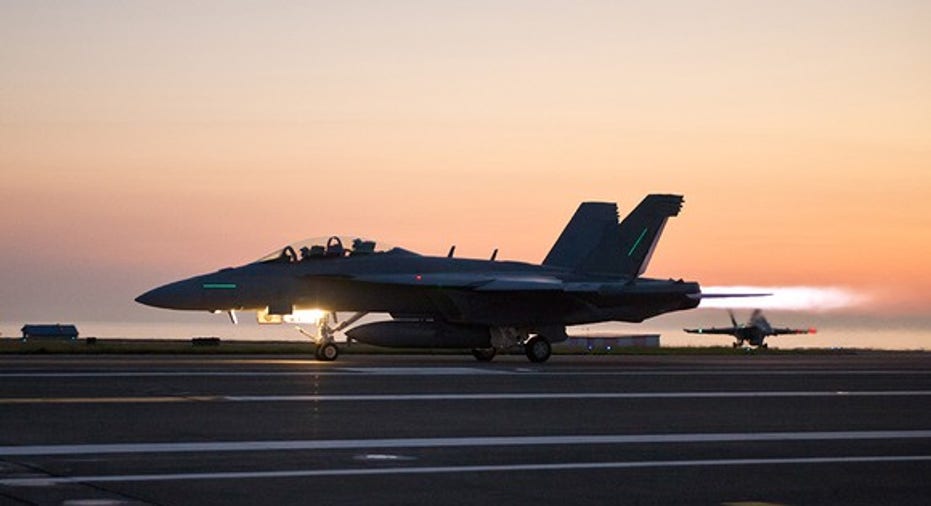Boeing's New Defense Strategy Scores a Big Win at Pentagon

The EA-18G Growler looks a lot like Boeing's F/A-18 Super Hornet, but specializes in electronic warfare. Image source: Boeing.
Boeing's (NYSE: BA) defense boss Leanne Caret calls herself a "realist."She reads the declining sales figures for Boeing's F-15 and F-18 fighter jets. She sees Lockheed Martin (NYSE: LMT) walking away with the market for fifth-generation stealth fighters. And a few months ago, she explained why all of this is fine with Boeing.
Resigned to the reality that the fighter business is "evolving," Caret laid out a plan in May to begin exiting the field of fighter jet construction, and focus instead on maintaining and upgrading the roughly 1,900 F-15 and F-18 fighter jets in service around the world today.
According to Caret, once you combine the revenues that can be generated from these mundane tasks with revenues from the sale of non-fighter jet Boeing planes such as the C-17 Globemaster, P-8A Poseidon, and KC-46 Pegasus, it's entirely possible for Boeing to maintain $25 billion in annual military sales -- without ever selling another fighter jet. As if to help prove the fact, Boeing just landed $1.27 billion in contracts to maintain and upgrade its aircraft -- in a single day.
Pentagon rides to the rescue
That day was August 1. In its daily digest of defense contracts, the Pentagon announced that it placed four separate orders for Boeing to supply the Defense Logistics Agency with unspecified "spare parts used in the F/A-18 aircraft." Each contract was described "as a five-year base contract," potentially to be supplemented ... with one five-year option period" (that may or may not be exercised). Combined, they're worth $1.01 billion.
All four contracts will supply plane parts used to repair Navy F/A-18 Super Hornet fighter aircraft. In separate contracts granted directly by the Navy, Boeing also won $254.5 million in funding to perform repairs on aircraft flight-control surfaces for F/A-18 Super Hornets and EA-18G Growler electronic-warfare aircraft through December 2019, and $10.2 million to supply "Distributed Targeting System" upgrades for the F/A-18 and EA-18G.
All together, the six contracts add up to $1.27 billion in maintenance and upgrades orders for Boeing.
What it means for investors
The fortuitous appearance of these contracts, so soon after Caret laid out Boeing's new plan for going forward, tends to support the executive's prediction of stabilizing revenues at Boeing Defense. But how much profit can investors expect to see from these contracts?
Pretty good profits, actually. Despite the decline in the fighter jets business, Boeing's Military Aircraft division continues to be the company's second most profitable, with a pre-tax profit margin of 9.8%, according to data from S&P Global Market Intelligence. Applied to the $1.27 billion in revenues expected from the above contracts, that should work out to $124 million or so in profits over the next five years -- perhaps more if the "options" are exercised. And even spread across the 623.8 million Boeing shares now outstanding, that works out to respectable profits of $0.20 per share.
The upshot for investors: Maintaining and upgrading fighter jets, and providing spare parts for same, may not be as "sexy" a business as building entirely new fighters. But as this month's contracts news shows, it's still a business that can earn good profits for Boeing, and for its shareholders, as well.
A secret billion-dollar stock opportunity The world's biggest tech company forgot to show you something, but a few Wall Street analysts and the Fool didn't miss a beat: There's a small company that's powering their brand-new gadgets and the coming revolution in technology. And we think its stock price has nearly unlimited room to run for early in-the-know investors! To be one of them, just click here.
Fool contributorRich Smithdoes not own shares of, nor is he short, any company named above. You can find him onMotley Fool CAPS, publicly pontificating under the handleTMFDitty, where he's currently ranked No. 301 out of more than 75,000 rated members.
The Motley Fool has no position in any of the stocks mentioned. Try any of our Foolish newsletter services free for 30 days. We Fools may not all hold the same opinions, but we all believe that considering a diverse range of insights makes us better investors. The Motley Fool has a disclosure policy.



















